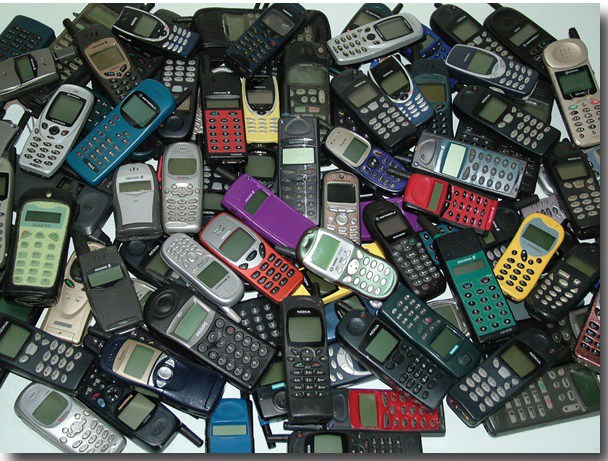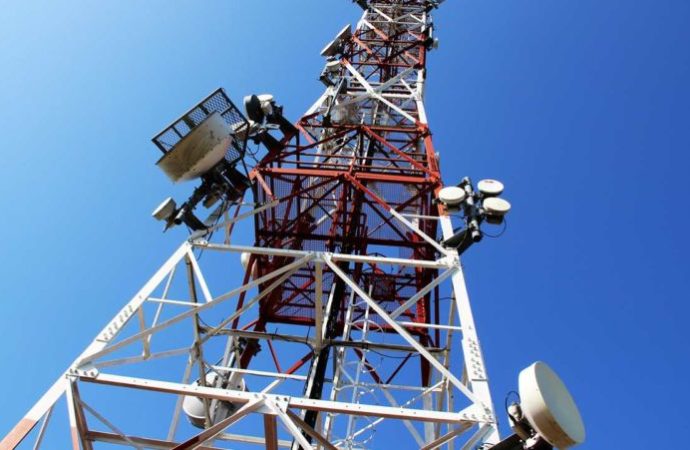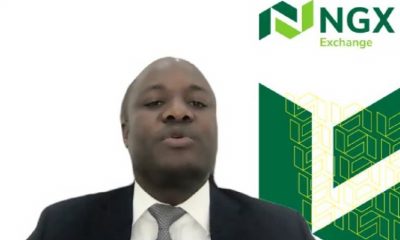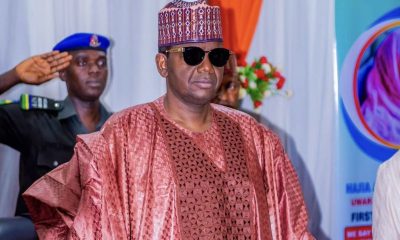Technology
Growing Nigerian Economy Via Mobile & Telecom Sector

By Adeniyi Ogunfowoke
Undoubtedly the giant of Africa, with an estimated population of 194 million people, Nigeria remains the largest mobile market in the continent and still has more potential for growth and for competing on a level-playing ground with the developed nations.
Although the economic growth of the country might not be as fast-paced as its counterparts’, it is full of hopes and promises.
The mobile trends published in the 2017 Nigerian Mobile Report, by Jumia Nigeria, Africa’s biggest e-commerce platform, provided some convictions for this belief.
In summary, the report examined how the market has democratized mobile internet use, the consumer behaviours driving increased smartphone adoption and the role of the different stakeholders within the sector.
Jumia is set to release the 2018 edition of the Mobile Report, which will focus on various mobile trends in the country and in Africa at large. And Juliet Anammah, CEO, Jumia Nigeria is as excited as everyone else about the report.
But, while we patiently wait for the report pending its release, let’s examine some facts and figures from the 2017 report.
There were about 150 million mobile subscribers equivalent to 81 percent penetration (as a percentage of the population) in 2016.
Internet penetration was at 18 percent with 216 million internet users while Nigeria’s internet penetration was much higher at 53 percent; its mobile subscription was similar to Africa’s at 81% penetration (960 million mobile subscribers).
To benchmark this data, a similar report by the Nigerian Communications Commission (NCC) put the number of subscribers, by the end of December 2016 – at 154 million. This subscriber base is a sum total of all the active subscribers for telephony services on each of the licensed service providers utilizing different technologies. The difference in the number of subscribers presented by both reports can be attributed to the lack of accurate census in the country.
Meanwhile, the percentage of internet penetration widened increasingly; number of internet subscribers peaked at 97.2 million (more than half the number of mobile subscriptions) by end of 2016, which represented a much higher penetration rate than the rest of Africa combined.
The subscriber base of internet users in the country was predicted to increase by at least 30 percent by end of 2017.
With the number of Nigerians having access to the internet, mostly through smartphones, growing in leaps and bounds, it’s a clear indication that there is a huge potential for e-commerce in the country.
For instance, Jumia recorded 394 percent growth on the sales of smartphones between 2014 and 2016, mostly driven by an increasing range of lower smartphones price points. And 71 percent of website visitors on Jumia Nigeria in 2016 used their mobile phones to shop, whereas only 53 percent of Jumia African customers did so.
Although, the contribution of the telecom & mobile sector to the country’s GDP was indeed a small fraction, according to a report by the NCC, only 9.13 percent was directly or indirectly accrued from the sector.
Yet, it is worthy of note to mention that it was a great leap from the previous year. E-commerce companies like Jumia, present in 15 African markets, are facilitating the promotion and distribution of both high-end and low-end price points mobile phones in Nigeria.
The NCC is not also relenting in exercising its power to regulate the operations of the licensed telecom operators especially in the area of voice & data tariff.
So, what is the future of the telecom and mobile sector in Nigeria? To witness an improvement over the previous years will require a collective, yet individual effort from both the private and public sectors. Primarily, the growth of the sector, among other things, depends on the availability of affordable mobile phones & data tariff. To the former, Jumia is committed – with its partners – to facilitating and leading the charge in this regard.
The week of March 15th-25th, 2018 will be interesting and exciting for the entire country for two reasons: the 2018 edition (4th report) of the Nigerian Mobile Report will be released at a press conference; and secondly, although still related to the first event is the commencement of Jumia Mobile Week (an entire week dedicated to the sales of mobile phones at the best prices in Nigeria).
Nothing beats the excitement of getting your dream mobile phone at nearly half the price and such was the frenzy all over the Nigerian cyberspace in 2017.
From the moment you spot the juicy deals, the swift race for the fastest fingers, the sigh of relief when you have successfully placed your order and the short wait for your order to be delivered.
Last year, Jumia Mobile Week featured 3 mouth-watering flash sales every day at nearly 50 percent off; both night crawlers and day troopers had a piece of the pie.
MTN also gave out free MTN 4G SIM and 20 percent data bonus on their data plan every time you recharged for the first 3 months. There were also juicy discounts on mobile brands like: Infinix at 40 percent off; Tecno at 20 percent off; Motorola at 50 percent off, and Innjoo at 20 percent off.
So, this year, which brands will top the list of Jumia top selling mobile phones? How much discounts will be available to customers and on what mobile brands? How much money are you hoping to save during this year’s Mobile Week? Which mobile phones will have the best deals this year? How much discount will Jumia offer on purchases done on its mobile App? How do you get to participate in the Treasure Hunt so as to win a coveted prize? How do you participate in the fashion accessory giveaways on social media by your favourite fashion celebrity/icon?
Your guess is as good as mine. But, you will find answers to all of these questions during the week of March 15th through 25th, 2018! Add it to your calendar. Join the conversation on social media using the #JumiaMobileWeek2018, and follow @JumiaNigeria across all social media platforms.
Adeniyi Ogunfowoke is a PR Associate at Jumia Travel.
Technology
Expert Reveals Top Cyber Threats Organisations Will Encounter in 2026

By Adedapo Adesanya
Organisations in 2026 face a cybersecurity landscape markedly different from previous years, driven by rapid artificial intelligence adoption, entrenched remote work models, and increasingly interconnected digital systems, with experts warning that these shifts have expanded attack surfaces faster than many security teams can effectively monitor.
According to the World Economic Forum’s Global Cybersecurity Outlook 2026, AI-related vulnerabilities now rank among the most urgent concerns, with 87 per cent of cybersecurity professionals worldwide highlighting them as a top risk.
In a note shared with Business Post, Mr Danny Mitchell, Cybersecurity Writer at Heimdal, said artificial intelligence presents a “category shift” in cyber risk.
“Attackers are manipulating the logic systems that increasingly run critical business processes,” he explained, noting that AI models controlling loan decisions or infrastructure have become high-value targets. Machine learning systems can be poisoned with corrupted training data or manipulated through adversarial inputs, often without immediate detection.
Mr Mitchell also warned that AI-powered phishing and fraud are growing more sophisticated. Deepfake technology and advanced language models now produce convincing emails, voice calls and videos that evade traditional detection.
“The sophistication of modern phishing means organisations can no longer rely solely on employee awareness training,” he said, urging multi-channel verification for sensitive transactions.
Supply chain vulnerabilities remain another major threat. Modern software ecosystems rely on numerous vendors and open-source components, each representing a potential entry point.
“Most organisations lack complete visibility into their software supply chain,” Mr Mitchell said, adding that attackers frequently exploit trusted vendors or update mechanisms to bypass perimeter defences.
Meanwhile, unpatched software vulnerabilities continue to expose organisations to risk, as attackers use automated tools to scan for weaknesses within hours of public disclosure. Legacy systems and critical infrastructure are especially difficult to secure.
Ransomware operations have also evolved, with criminals spending weeks inside networks before launching attacks.
“Modern ransomware operations function like businesses,” Mitchell observed, employing double extortion tactics to maximise pressure on victims.
Mr Mitchell concluded that the common thread across 2026 threats is complexity, noting that organisations need to abandon the idea that they can defend against everything equally, as this approach spreads resources too thin and leaves critical assets exposed.
“You cannot protect what you don’t know exists,” he said, urging organisations to prioritise visibility, map dependencies, and focus resources on the most critical assets.
Technology
NCC Begins Review of National Telecommunications Policy After 26 Years

By Adedapo Adesanya
In a consultation paper released to the public, the commission said it is seeking input from stakeholders, including telecom operators, tech companies, legal experts, and the general public, on proposed revisions designed to reposition Nigeria’s telecommunications framework to match current digital demands. Submissions are expected by March 20, 2026.
The NTP 2000 marked a turning point in Nigeria’s telecom landscape. It replaced the 1998 policy, introducing full liberalisation and a unified regulatory framework under the NCC, and paved the way for the licensing of GSM operators such as MTN, Econet (now Airtel), and Globacom in 2001 and 2002.
Prior to the NTP, the sector was dominated by Nigerian Telecommunications Limited (NITEL), a government-owned monopoly plagued by obsolete equipment, low teledensity, and poor service. At the time, Nigeria had fewer than 400,000 telephone lines for the entire country.
However, the NCC noted that just as the 1998 policy was overtaken by global developments, the 2000 framework has become structurally misaligned with today’s telecom reality, which encompasses broadband, 5G networks, satellite internet, artificial intelligence, and a thriving digital economy worth billions of dollars.
“The rapid pace of technological change and emerging digital services necessitate a comprehensive update to ensure the policy continues to support economic growth while protecting critical infrastructure,” the Commission stated.
The review will target multiple chapters of the policy. Key revisions include: Enhancements on online safety, content moderation, digital services regulation, and improved internet exchange protocols; a modern framework for satellite harmonisation, coexistence with terrestrial networks, and clearer spectrum allocation to boost service quality, and policies to address fiscal support, reduce multiple taxation, and lower operational costs for operators.
The NCC is also proposing entirely new sections to the policy to address emerging priorities. Among the key initiatives are clear broadband objectives aimed at achieving 70 per cent national broadband penetration, with a focus on extending connectivity beyond urban centres to reach rural communities.
The review also seeks to formally recognise telecom infrastructure, including fibre optic cables and network masts, as Critical National Infrastructure to prevent vandalism and enhance security.
In addition, the commission is targeting the harmonisation of Right-of-Way charges across federal, state, and local governments, alongside the introduction of a one-stop permitting process for telecom deployment, designed to reduce bureaucratic delays and lower operational costs for operators.
According to the NCC, the review aims to make fast and affordable internet widely accessible. “The old framework was largely voice-centric. Today, data is the currency of the digital economy,” the commission said, highlighting the need to close the urban-rural broadband divide.
The consultation process is intended to gather diverse perspectives to ensure the updated policy reflects current technological trends, market realities, and consumer needs. By doing so, the NCC hopes to maintain the telecommunications sector’s role as a key driver of economic growth and digital inclusion.
Technology
FG to Scrutinise MTN’s $2.2bn Full Take Over of IHS Towers

By Adedapo Adesanya
The Minister of Communications, Innovation and Digital Economy, Mr Bosun Tijani, says the Nigerian government is assessing MTN Group’s acquisition of IHS Towers to ensure the deal aligns with Nigeria’s telecommunications development goals.
On Tuesday, MTN Group said it has agreed to acquire the remaining 75.3 per cent stake in IHS Holding Limited in an all-cash deal valued at $2.2 billion. The deal will be funded through the rollover of MTN’s existing stake of around 24 per cent in IHS, as well as about $1.1 billion in cash from MTN, roughly $1.1 billion from IHS’s balance sheet, and the rollover of no more than existing IHS debt.
Mr Tijani, in a statement, said the administration of President Bola Tinubu has spent the past two years strengthening the telecom sector through policy clarity, regulatory support, and engagement with industry stakeholders, boosting investor confidence and sector performance.
“Recent financial results from key operators show improved profitability, increased investment in telecoms infrastructure, and operational stability across the sector,” he said.
“These gains reflect the resilience of the industry and the impact of government reforms.”
The minister added that telecommunications infrastructure is critical for national security, economic growth, financial services, innovation, and social inclusion.
“We will undertake a thorough assessment of this development with relevant regulatory authorities to review its impact on the sector,” Mr Tijani said.
He added that the review aims to ensure market consolidation or structural changes, protect consumers, safeguard investments, and preserve the long-term sustainability of the telecom industry.
Mr Tijani also said the government remains committed to maintaining a stable and forward-looking policy environment to keep Nigeria’s telecommunications sector strong and sustainable, in line with the administration’s broader digital economy vision.
Upon completion, the transaction will see MTN transition from being a minority shareholder in IHS to a full owner. It will also see IHS exit from the New York Stock Exchange and become a wholly owned subsidiary of MTN.
For MTN, the deal represents a decisive shift as data demand surges and digital infrastructure becomes increasingly strategic with a booming digitally-oriented youth population on the continent.
-

 Feature/OPED6 years ago
Feature/OPED6 years agoDavos was Different this year
-
Travel/Tourism10 years ago
Lagos Seals Western Lodge Hotel In Ikorodu
-

 Showbiz3 years ago
Showbiz3 years agoEstranged Lover Releases Videos of Empress Njamah Bathing
-

 Banking8 years ago
Banking8 years agoSort Codes of GTBank Branches in Nigeria
-

 Economy3 years ago
Economy3 years agoSubsidy Removal: CNG at N130 Per Litre Cheaper Than Petrol—IPMAN
-

 Banking3 years ago
Banking3 years agoSort Codes of UBA Branches in Nigeria
-

 Banking3 years ago
Banking3 years agoFirst Bank Announces Planned Downtime
-

 Sports3 years ago
Sports3 years agoHighest Paid Nigerian Footballer – How Much Do Nigerian Footballers Earn

















1 Comment